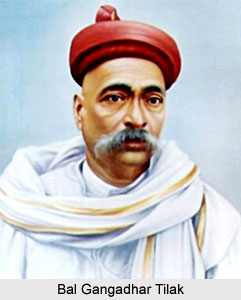 Marathi Literature during the Indian National Movement was the outcome as well as a motivating factor for the many social and political changes that were taking place at the time. One of the major influences on Marathi Literature during the Indian National Movement was Bal Gangadhar Tilak. The Marathi literature during the phase of the Indian National Movement can be better understood by taking a look at the various contending views that existed during this time. The death of Bal Gangadhar Tilak marked the end of an era in the history of Maharashtra. His conservative social views and radical nationalist politics had gone a long way in shaping the Maharashtrian society during that period. The nationalist discourse that he shaped created a "national consciousness" heavily influenced by scriptural or canonical authority. He did not subscribe to the progressive views or the liberal, secular and rational attitudes which looked towards the west for a model. Consequently the urban, educated middle class was unable to develop a broad social base for the national movement.
Marathi Literature during the Indian National Movement was the outcome as well as a motivating factor for the many social and political changes that were taking place at the time. One of the major influences on Marathi Literature during the Indian National Movement was Bal Gangadhar Tilak. The Marathi literature during the phase of the Indian National Movement can be better understood by taking a look at the various contending views that existed during this time. The death of Bal Gangadhar Tilak marked the end of an era in the history of Maharashtra. His conservative social views and radical nationalist politics had gone a long way in shaping the Maharashtrian society during that period. The nationalist discourse that he shaped created a "national consciousness" heavily influenced by scriptural or canonical authority. He did not subscribe to the progressive views or the liberal, secular and rational attitudes which looked towards the west for a model. Consequently the urban, educated middle class was unable to develop a broad social base for the national movement.
Following his death, the dichotomy of revivalist and reformist trends within the nationalist movement became fairly pronounced during this time. How to reach the goal of national independence, the methods, and the strategies became a contested terrain. A group among nationalists believed that as long as the British had an edge over the Indians in the development and application of science and technology, they would continue to set the standards in religion, cultures and politics. Those Indians who were close to the colonial rule and its reward system shared the values and aspirations of the Raj. To them, British rule in India was the first essential step toward a just, equal, and "modern" world.
On the other hand, the nationalist thinkers began to assert that backwardness is not something that is ingrained in the Indian culture. On the contrary it was a result of the subjugation of the Indians by attributes of "modernity" associated with the West. They called for a synthesis between the modernity of the west and the spirituality of the east as the path and this was the elitist program during the Nationalist struggle. The limitations of elitist politics were clear by the 1920s. The impact of the Bolshevik revolution and the appeal of Marxist views were quite widespread among the elite. During this time, Mahatma Gandhi was involved in manoeuvring a national political movement toward Independence.
Thus it was in this political and social environ that Marathi literature of the nationalist period flourished. It is possible to see in the literature of this period the contest between different ideologies to assert their supremacy. Gandhism did not influence the writers and their writings directly, but Mahatma Gandhi`s program for national reawakening struck a responsive note in Marathi literature, prominently in drama. Similarly, Marxist ideas also inspired many Marathi writers, but the mainstream of Marathi literature during this period remained under the sway of the urban, educated middle class. These various tendencies in the political and social life of Maharashtra are reflected in the literature of the period in different ways.













